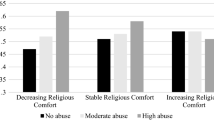Abstract
The purpose of this research was to examine reports of and pathways to posttraumatic growth (PTG) by emerging adults who have experienced trauma during adolescence compared with a comparison group recruited from the same sample frame. The sample consisted of 546 college students; 359 reported having experienced a traumatic event during adolescence, and 187 college students reporting no such trauma made up the comparison group. Independent t-tests revealed that the comparison group reported more growth in the domain of new possibilities; whereas, the trauma group reported more growth in the domains of spiritual change and appreciation for life. Structural equation modelling revealed no differences in factor loadings or path regression weights between the groups, suggesting that there was consistency in the influence that attachment, social support, and coping had on reports of PTG. However, constraining the intercepts did result in a poorer model fit; specifically, scores of growth in new possibilities and engagement in intrapersonal coping strategies (active, positive reframing, planning) were higher for the comparison group. Because these coping strategies also had the strongest path coefficient to PTG across groups, engagement in intrapersonal coping strategies appears to be a pathway to realizing growth, which is more likely to be experienced by college students but less likely to be achieved by emerging adults of adolescent trauma.



Similar content being viewed by others
References
Aldwin, C. M., & Levenson, M. R. (2004). Posttraumatic growth: A developmental perspective. Psychological Inquiry, 15, 19–22.
American Psychiatric Association. (2005). Diagnostic and statistical manual of mental disorders (4th ed. Text Revision). Washington, DC: American Psychiatric Association.
Anderson, W. R., & Lopez-Baez, S. I. (2008). Measuring growth with the posttraumatic growth inventory. Measurement and Evaluation in Counseling and Development, 40, 215–227.
Anderson, W. R., & Lopez-Baez, S. I. (2011). Measuring personal growth attributed to a semester of college life using the posttraumatic growth inventory. Counseling and Values, 56, 73–82.
Arnett, J. J. (2000). Emerging adulthood: A theory of development from the late teens through the twenties. American Psychologist, 55, 469–480.
Bellizzi, K. M., & Blank, T. O. (2006). Predicting posttraumatic growth in breast cancer survivors. Health Psychology, 25, 47–56.
Cadell, S., Regehr, C., & Hemsworth, D. (2003). Factors contributing to posttraumatic growth: A proposed structural equation model. American Journal of Orthopsychiatry, 73, 279–287.
Carver, C. (1997a). Adult attachment and personality: Converging evidence and a new measure. Personality and Social Psychology Bulletin, 23, 865–883.
Carver, C. (1997b). You want to measure coping but your protocol's too long: Consider the brief COPE. International Journal of Behavioral Medicine, 4, 92–100.
Gottlieb, B. H., Still, E., & Newby-Clark, I. R. (2007). Types and precipitants of growth and decline in emerging adulthood. Journal of Adolescent Research, 22, 132–155.
Kline, R. B. (2011). Principles and practice of structural equation modeling. New York: Guilford Press.
Kubany, E. S., Leisen, M., Kaplan, A. S., Watson, S. B., Haynes, S. N., Owens, J. A., & Burns, K. (2000). Development and preliminary validation of a brief broad-spectrum measure of trauma exposure: The traumatic life events questionnaire. Psychological Assessment, 12, 210–224.
Mikulincer, M., & Florian, V. (1995). Appraisal of and coping with a real-life stressful situation: The contribution of attachment styles. Personality and Social Psychology Bulletin, 21, 406–414.
Morris, B. A., Shakespeare-Finch, J., & Scott, J. L. (2007). Coping processes and dimensions of posttraumatic growth. The Australasian Journal of Disaster and Trauma Studies, 1, 1–10.
Ognibene, T. C., & Collins, N. L. (1998). Adult attachment styles, perceived social support and coping strategies. Journal of Social and Personal Relationships, 15, 323–345.
Park, C. L. (2009). Overview of theoretical perspectives. In C. Park, S. Lechner, M. Antoni, & A. Stanton (Eds.), Medical illness and positive life change: Can crisis lead to personal transformation? (pp. 11–30). Washington, DC: American Psychological Association.
Park, C., Cohen, L., & Murch, R. (1996). Assessment and prediction of stress-related growth. Journal of Personality, 64, 71–105.
Park, C. L., Aldwin, C. M., Fenster, J. R., & Snyder, L. B. (2008). Pathways to posttraumatic growth versus posttraumatic stress: Coping and emotional reactions following the September 11, 2001, terrorist attacks. The American Journal of Orthopsychiatry, 78, 300–312.
Prati, G., & Pietrantoni, L. (2009). Optimism, social support, and coping strategies as factors contributing to posttraumatic growth: A meta-analysis. Journal of Loss and Trauma, 14, 364–388.
Salo, J. A., Qouta, S., & Punamäki, R. (2005). Adult attachment, posttraumatic growth and negative emotions among former political prisoners. Anxiety, Stress & Coping: An International Journal, 18(4), 361–378.
Schmidt, S. D., Blank, T. O., Bellizzi, K. M., & Park, C. L. (2012). The relationship of coping strategies, social support, and attachment style with posttraumatic growth in cancer survivors. Journal of Health Psychology, 17, 1033–1040.
Sherbourne, C., & Stewart, A. (1991). The MOS social support survey. Social Science & Medicine, 32, 705–714.
Swickert, R., & Hittner, J. (2009). Social support coping mediates the relationship between gender and posttraumatic growth. Journal of Health Psychology, 14, 387–393.
Tedeschi, R. G., & Calhoun, L. G. (1996). The posttraumatic growth inventory: Measuring the positive legacy of trauma. Journal of Traumatic Stress, 9, 455–471.
Tedeschi, R. G., & Calhoun, L. G. (2004). Posttraumatic growth: Conceptual foundations and empirical evidence. Psychological Inquiry, 15, 1–18.
Thornton, A. A., & Perez, M. A. (2006). Posttraumatic growth in prostate cancer survivors and their partners. Psycho-Oncology, 15, 285–296.
Author information
Authors and Affiliations
Corresponding author
Ethics declarations
Conflict of Interest
The authors declare that they have no conflict of interest.
Ethical Approval
All procedures performed in studies involving human participants were in accordance with the ethical standards of the institutional and/or national research committee and with the 1964 Helsinki declaration and its later amendments or comparable ethical standards.
Informed Consent
Informed consent was obtained from all individual participants included in the study.
Rights and permissions
About this article
Cite this article
Schmidt, S.D., Blank, T.O., Bellizzi, K.M. et al. Posttraumatic Growth Reported by Emerging Adults: a Multigroup Analysis of the Roles of Attachment, Support, and Coping. Curr Psychol 38, 1225–1234 (2019). https://doi.org/10.1007/s12144-017-9670-0
Published:
Issue Date:
DOI: https://doi.org/10.1007/s12144-017-9670-0




